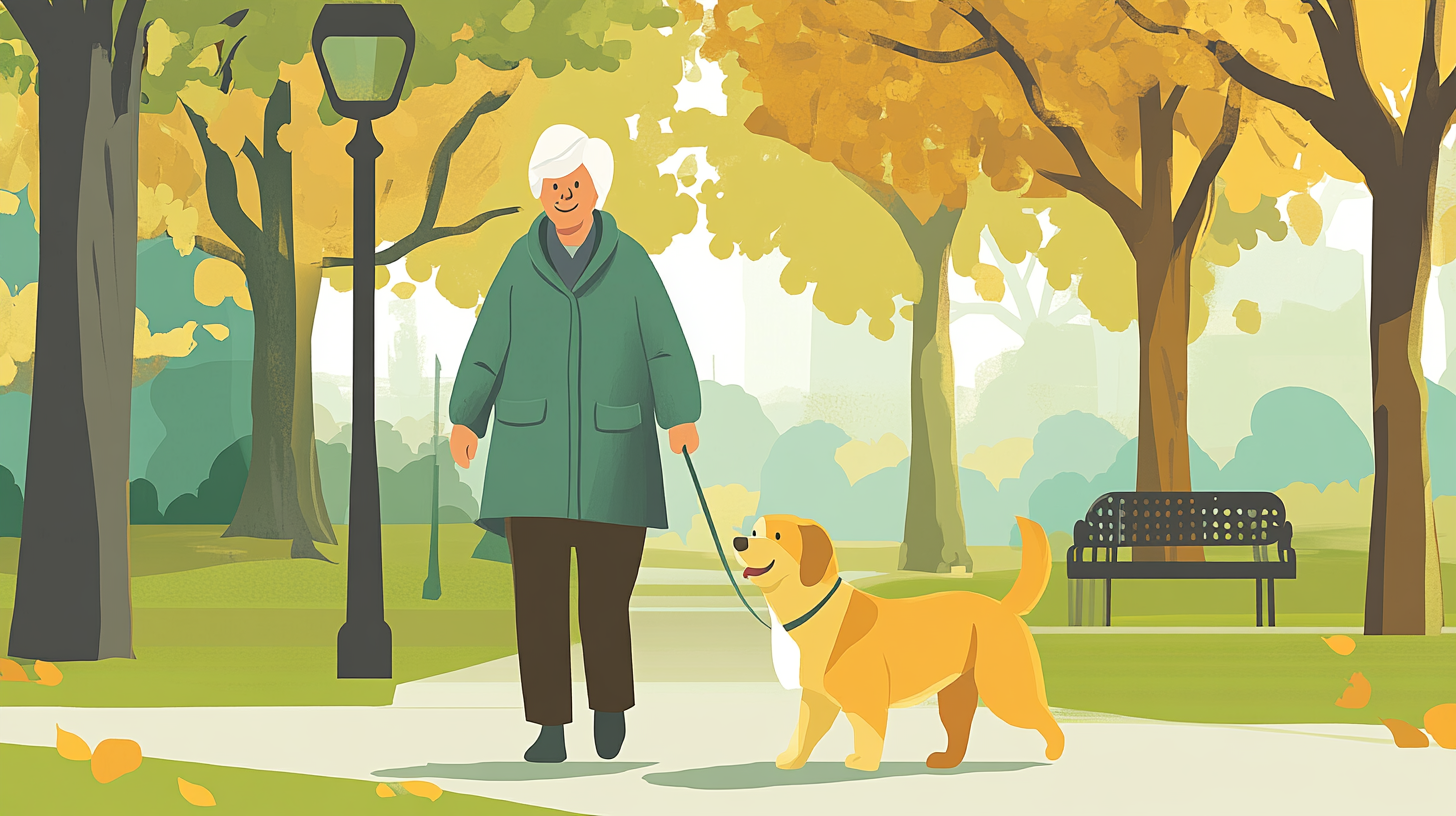As we age, finding fulfilling activities that keep us active and engaged becomes increasingly important.
For many seniors, pet-sitting and dog walking offer the perfect blend of physical activity, social interaction, and the joy of animal companionship.
These activities not only provide a sense of purpose but can also contribute to improved health and well-being.
Let’s explore how seniors can benefit from and get involved in pet-sitting and dog walking.
The Benefits of Pet-Sitting and Dog Walking for Seniors
Engaging with animals through pet-sitting and dog walking can have numerous positive impacts on seniors’ lives.
Physical Health Improvements
Regular dog walking provides an excellent form of low-impact exercise.
It helps maintain mobility, strengthens muscles, and improves cardiovascular health.
Even short walks can contribute significantly to daily physical activity goals.
Mental Health Boost
Spending time with animals has been shown to reduce stress, anxiety, and depression.
The companionship of a pet, even temporarily, can combat feelings of loneliness and isolation often experienced by seniors.
Increased Social Interaction
Dog walking often leads to conversations with other pet owners or neighbors.
This increased social interaction can help seniors stay connected to their community.
Sense of Purpose and Responsibility
Caring for a pet, even for a short period, provides a sense of purpose and routine.
This can be especially beneficial for seniors who may feel a loss of direction after retirement.
Cognitive Stimulation
Pet-sitting involves various tasks that can help keep the mind sharp, such as remembering feeding schedules, medication times, and specific care instructions.
Getting Started with Pet-Sitting and Dog Walking
For seniors interested in exploring these activities, here are some steps to get started.
Assess Your Physical Capabilities
Before committing to pet-sitting or dog walking, it’s important to honestly evaluate your physical abilities.
Consider factors like mobility, strength, and endurance.
Start with Family and Friends
Begin by offering to pet-sit or walk dogs for family members or close friends.
This allows you to gain experience in a familiar and supportive environment.
Join Local Pet-Sitting Networks
Look for local pet-sitting groups or networks in your community.
These can be found through social media, community centers, or local pet stores.
Consider Professional Platforms
Explore online platforms that connect pet owners with sitters and walkers.
Many of these platforms welcome seniors and offer flexible scheduling options.
Take a Pet First Aid Course
Enhance your skills and build confidence by taking a pet first aid course.
This knowledge can be invaluable when caring for animals.
Safety Considerations for Senior Pet-Sitters and Dog Walkers
While rewarding, pet-sitting and dog walking do come with certain risks.
Here are some safety tips for seniors:
Choose Appropriate Pets
Select pets that match your physical capabilities.
Smaller, well-trained dogs are often easier to manage for seniors.
Use Proper Equipment
Invest in comfortable, non-slip shoes and a sturdy leash with a secure grip.
Consider using a waist leash for added stability when walking dogs.
Be Aware of Your Surroundings
Stay alert to potential hazards when walking, such as uneven sidewalks or other animals.
Know Your Limits
Don’t hesitate to decline pet-sitting or walking opportunities that seem too challenging.
It’s important to prioritize your safety and comfort.
Carry a Mobile Phone
Always have a charged mobile phone with you in case of emergencies.
Building a Pet-Sitting or Dog Walking Routine
Establishing a consistent routine can make pet-sitting and dog walking more enjoyable and manageable.
Start Slowly
Begin with short sessions and gradually increase duration as you build stamina and confidence.
Create a Schedule
Develop a regular schedule for pet-sitting or dog walking activities.
This helps both you and the pets adjust to a routine.
Take Breaks
Remember to take regular breaks, especially during longer pet-sitting assignments or walks.
Stay Hydrated
Always carry water for both yourself and the pets, especially during warmer months.
The Emotional Rewards of Working with Pets
Beyond the physical benefits, the emotional connection with animals can be profoundly rewarding for seniors.
Unconditional Love
Pets offer unconditional love and acceptance, which can be incredibly comforting.
Stress Relief
The simple act of petting a dog or cat can lower blood pressure and reduce stress hormones.
Laughter and Joy
The playful antics of pets often bring laughter and lighthearted moments to our days.
Sense of Companionship
Even short-term pet-sitting can provide a wonderful sense of companionship and combat feelings of loneliness.
Overcoming Challenges
While pet-sitting and dog walking offer many benefits, there can be challenges.
Here are some tips for overcoming common issues:
Allergies
If you have mild allergies, consult with your doctor about management strategies.
Consider pet-sitting for hypoallergenic breeds.
Physical Limitations
Work within your physical capabilities and communicate clearly with pet owners about what you can and cannot do.
Time Management
Start with occasional pet-sitting or walking before committing to regular schedules.
This allows you to gauge how it fits into your lifestyle.
Conclusion
Pet-sitting and dog walking can be incredibly rewarding activities for seniors, offering a unique blend of physical exercise, emotional fulfillment, and social interaction.
By starting slowly, prioritizing safety, and building meaningful connections with animals and their owners, seniors can enjoy the many benefits of these activities.
Whether it’s a daily dog walk or occasional pet-sitting, the companionship of animals can bring joy, purpose, and improved well-being to your golden years.
Sharing is Caring
Are you a senior who has found joy in pet-sitting or dog walking?
We’d love to hear your story!
Share your experiences and photos on Facebook using the hashtag #SeniorPetPals.
Your story could inspire other seniors to discover the rewards of spending time with furry friends.
Let’s create a community of animal-loving seniors and show that the bond between humans and pets knows no age limit!
SHARE now with your friends!
- Hero Farm Dog Survives Epic Battle with Coyote Pack - December 9, 2024
- The 10-Minute Bedtime Routine That Changed My Dog’s Sleep Forever - November 29, 2024
- Creating a Safe Space for Nervous Pets: Your Guide to Pet-Friendly Havens - November 25, 2024

